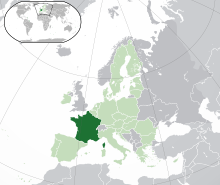Intersex rights in France
|
Intersex rights in France |
|
|---|---|

Location of Metropolitan France (dark green)
– in Europe (light green & dark grey) |
|
| Protection of physical integrity and bodily autonomy | No |
| Reparations | No |
| Protection from discrimination | No |
| Third gender or sex classifications | No |
| Marriage | Yes |
| Rights by country | |
– in Europe (light green & dark grey)
– in the European Union (light green) – [Legend]
Intersex people in France face significant gaps in protection from non-consensual medical interventions and protection from discrimination. The birth of Herculine Barbin, a nineteenth-century intersex woman, is marked in Intersex Day of Remembrance. Barbin may have been the first intersex person to write a memoir, later published by Michel Foucault.
In response to pressure from intersex activists and recommendations by United Nations Treaty Bodies, the Senate published an inquiry into the treatment of intersex people in February 2017. It calls for significant changes to some medical practices, and also reparations for individuals subjected to coercive medical treatment. An individual, Gaëtan Schmitt, has taken legal action to obtain civil status as "neutral sex" ("sexe neutre") but, in May 2017, this was rejected by the Court of Cassation.
The 12th-century canon law collection known as the Decretum Gratiani states that "Whether an hermaphrodite may witness a testament, depends on which sex prevails" ("Hermafroditus an ad testamentum adhiberi possit, qualitas sexus incalescentis ostendit.") On ordainment, Raming, Macy and Cook found that the Decretum Gratiani states, "item Hermafroditus. If therefore the person is drawn to the feminine more than the male, the person does not receive the order. If the reverse, the person is able to receive but ought not to be ordained on account of deformity and monstrosity."
Herculine Barbin was raised in a convent in the early nineteenth century. From puberty, her body began to exhibit more masculine traits. In line with early legal practices, she was reassigned as male following an affair. She subsequently took her own life. She may have been the earliest intersex person to write a memoir, and these were later published by Michel Foucault, accompanied by a commentary and other materials. In his commentary to Barbin's memoirs, Foucault presented Barbin as an example of the "happy limbo of a non-identity", but whose masculinity marked her from her contemporaries.Morgan Holmes states that Barbin's own writings showed that she saw herself as an "exceptional female", but female nonetheless. Barbin's birth is now marked as Intersex Day of Remembrance.
...
Wikipedia
